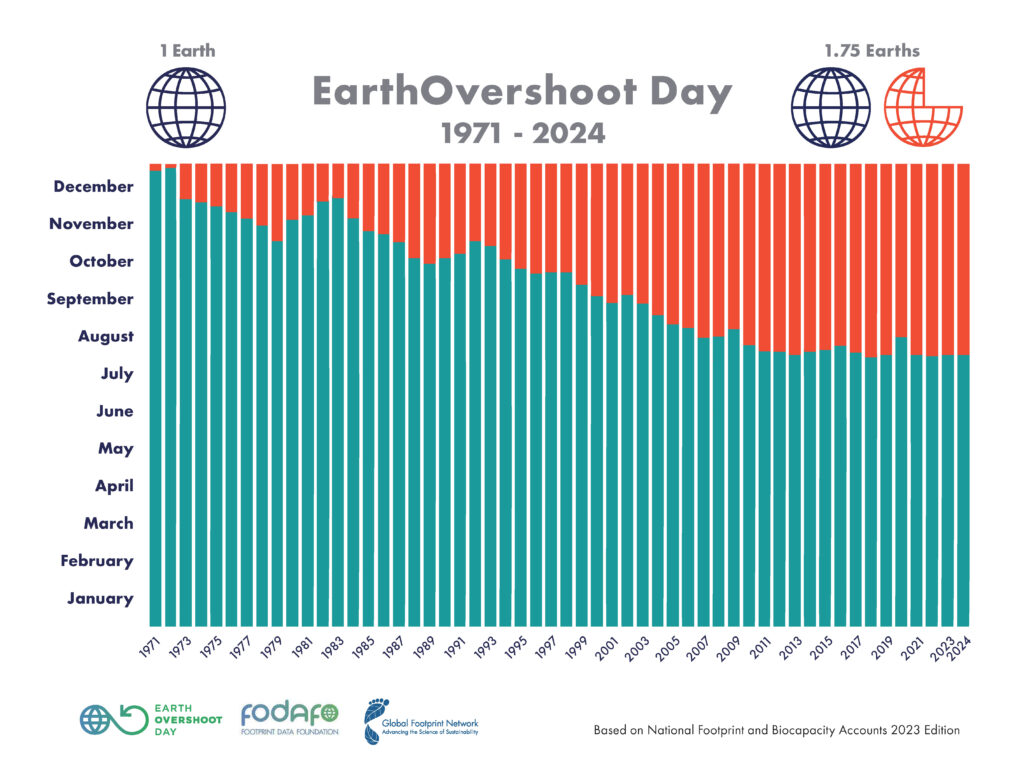

Earth Overshoot Day 2024 falls on August 1st
Ending Overshoot: Humanity’s Critical Race
GENEVA, SWITZERLAND — August 1st marks Earth Overshoot Day, the date when humanity has used up nature’s resource budget for the entire year, according to Global Footprint Network, an international sustainability organization that pioneered the Ecological Footprint.
Earth Overshoot Day falling on August 1st signifies that humanity is currently using nature 1.7 times faster than our planet’s ecosystems can regenerate. This overshoot is possible by depleting natural capital, which compromises resource security. The consequences of ecological overspending are evident in deforestation, soil erosion, biodiversity loss, and the buildup of carbon dioxide in the atmosphere, which leads to more frequent extreme weather events and reduced food production.
Although Earth Overshoot Day has held steady for a decade, it remains early in the year, occurring just after 7 months of the year have passed. The remainder of the year humanity lives from overuse, further depleting the biosphere. Therefore, even as the date holds steady, the pressure on the planet keeps increasing, since damage from overshoot accumulates over time.

Lewis Akenji, Global Footprint Network board member, states: “Overshoot will end. The question is how: by design or by disaster. A planned transition gives us better security than ceding to the whims of a planet thrown off balance by overshoot.”
Like athletes achieving breakthroughs, humanity must focus, innovate, and exert effort to succeed. For instance, Dick Fosbury revolutionized the high jump at the 1968 Olympics, when humanity used just under one Earth. By 1988, when Olympian sailor Lawrence Lemieux stopped mid-race to rescue two capsized competitors, humanity was using 1.3 Earths. In 2008, as Usain Bolt broke his first Olympic records, resource use had grown to 1.6 Earths. Will we have the resolve to reverse overshoot with similar determination?
“Ending overshoot is essential. It is also possible, given human potential,” comments Debora Barioni of Global Footprint Network.
Solutions that #MoveTheDate are available and financially advantageous. Opportunities exist in five key areas: Cities, Energy, Food, Population, and Planet. The Power of Possibility highlights options that move Earth Overshoot Day. For example, cutting CO2 emissions from fossil fuels by 50% would #MoveTheDate by three months. There are also businesses that #MoveTheDate as they expand. Such businesses may be the ones best positioned to gain value in a future of climate change and resource constraints.
Additional resources
How Earth Overshoot Day 2024 was calculated
How to compare the date of Earth Overshoot Day to previous years
Ecological Footprint data for more than 200 countries and regions
Infographics and videos available for media
Introduction to the implications of overshoot
Solutions to reverse ecological overshoot and bolster biological regeneration
About the Ecological Footprint
The Ecological Footprint is the most comprehensive biological resource accounting metric available. Based on 15,000 data points per country per year, it adds up all of people’s competing demands for biologically productive areas – food, timber, fibers, carbon sequestration, and accommodation of infrastructure. Currently, the carbon footprint, i.e., the carbon emissions from burning fossil fuel, make up 61 percent of humanity’s Ecological Footprint. The National Footprint and Biocapacity Accounts are now produced by FoDaFo with York University in Toronto.
About Global Footprint Network
Global Footprint Network is an international sustainability organization that is helping the world live within the Earth’s means and respond to climate change. Since 2003 we’ve engaged with more than 50 countries, 30 cities, and 70 global partners to deliver scientific insights that have driven high-impact policy and investment decisions. Together, we’re creating a future where all of us can thrive within the limits of our one planet. www.footprintnetwork.org
